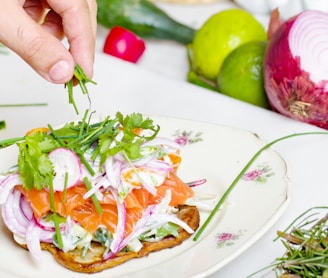Nutrition Tips for a Healthy Lifestyle
Fuel your body with the right nutrients for optimal health and vitality. Discover delicious and nutritious recipes, learn about essential vitamins and minerals, and get expert advice on maintaining a healthy diet.
EATING
8/13/20232 min read


Fuel your body with the right nutrients for optimal health and vitality. Discover delicious and nutritious recipes, learn about essential vitamins and minerals, and get expert advice on maintaining a healthy diet.
1. Essential Nutrients:
a. Macronutrients:
Carbohydrates: Provide energy. Opt for complex carbs like whole grains, fruits, and vegetables.
Proteins: Support muscle growth and repair. Include lean sources like poultry, fish, beans, and tofu.
Fats: Aid in nutrient absorption and hormone production. Choose healthy fats from sources like avocados, nuts, seeds, and olive oil.
b. Micronutrients:
Vitamins: Play crucial roles in various bodily functions. Consume a variety of fruits, vegetables, and whole foods to get a range of vitamins.
Minerals: Essential for bone health, immune function, and more. Include sources like leafy greens, nuts, seeds, and whole grains.
2. Healthy Eating Tips:
a. Balanced Diet:
Strive for a balanced plate with a mix of carbs, proteins, and healthy fats in each meal.
Include a variety of colorful fruits and vegetables to ensure a diverse nutrient intake.
b. Whole Foods:
c. Portion Control:
Choose whole, unprocessed foods over processed ones. Whole foods retain more nutrients and fiber.
Be mindful of portion sizes to avoid overeating. Use smaller plates to help control portions.
d. Hydration:
Drink plenty of water throughout the day to stay hydrated and support bodily functions.
e. Limit Added Sugars and Salt:
Minimize consumption of sugary foods and drinks. Opt for natural sweeteners when needed.
Reduce salt intake by using herbs and spices to flavor your meals instead.
f. Meal Planning:
Plan your meals ahead to ensure balanced nutrition and avoid making unhealthy choices when hungry.
3. Nutritious Recipes:
a. Breakfast:
Overnight oats with fruits and nuts.
Veggie omelette with whole-grain toast.
b. Lunch:
Grilled chicken salad with mixed greens, vegetables, and a light vinaigrette.
Quinoa and black bean bowl with avocado and salsa.
c. Dinner:
Baked salmon with roasted vegetables and quinoa.
Stir-fried tofu with broccoli, bell peppers, and brown rice.
d. Snacks:
Greek yogurt with berries and a drizzle of honey.
Hummus with carrot and cucumber sticks.
4. Expert Advice:
a. Registered Dietitian/Nutritionist (RD/RDN):
Seek guidance from a qualified RD/RDN who can provide personalized nutrition advice based on your needs and goals.
b. Individualization:
Everyone's nutritional needs are unique. Customize your diet based on your age, activity level, health conditions, and preferences.
c. Moderation and Variety:
Embrace a variety of foods to ensure a well-rounded nutrient intake. Enjoy your favorite treats in moderation.
d. Long-Term Approach:
Focus on making sustainable changes rather than adopting extreme diets. Consistency is key.
e. Education:
Continue learning about nutrition and staying up-to-date with reliable sources.
Healthy Living
Long Life, Less suffering from preventable issues
Remember that a healthy diet is about nourishing your body and enjoying a variety of foods that provide the nutrients it needs. By following these principles, exploring nutritious recipes, and seeking guidance from experts, you can achieve and maintain optimal health and vitality.